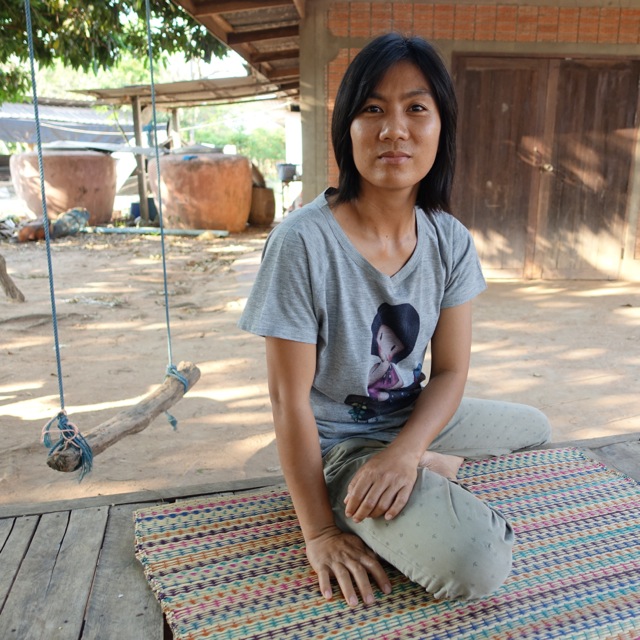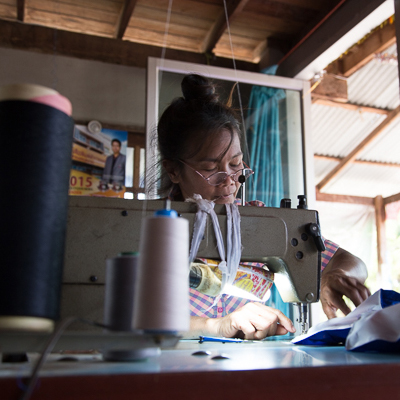In the debt-ridden Northeast, many rice farmers struggle to make ends meet after the government shut off the irrigation systems leaving them without the profits of the second annual rice crop. But for the military government, the drought might help its economic strategy.
Outside her Khon Kaen home, rice farmer Sumatra Sodatoom sits in the shade of a longan tree. In April, Ms. Sumatra is usually off selling her second rice harvest of the year. But this year, the government closed the country’s irrigation system early, preventing many farmers in the dry Northeast from planting the off-season rice crop they have come to depend on.
Late last year, the military government announced through the village loudspeaker in Nong Kha village that it would close the taps of the area’s irrigation system. In February, the Royal Irrigation Department warned that Thailand would be hit by its worst drought in decades after water levels sank to a
15-year low.
After the main rice crop is harvested, Thai rice farmers with access to irrigation often grow a second or off-season rice crop. Like many other rice farmers in the Northeast, Ms. Sumatra needs the income from the second annual harvest to pay off her debt.
Her family owes 800,000 baht (roughly $23,000) to the Bank for Agriculture and Agricultural Cooperatives (BAAC). Ms. Sumatra’s personal debt amounts to 280,000 baht (about $8,600) from loans she took out for her undergraduate degree.
“Next year our debt situation will get even worse than it is already because we will have to pay off the lease for our tractor,” says 31-year-old Ms. Sumatra.
Her family racked up debt during a failed investment in chicken contract farming, and they are not alone. According to Nong Kha’s Headwoman Bua-ngoen Plamsin, almost all of the village’s 165 households are in debt to either the BAAC or the village fund program.
“Everything would be much better if the government had given us a price guarantee for our rice. Instead of talking about cheap loans, they should make sure we get a good price for our crops,” says 31-year-old rice farmer Sumatra Sodatoom
For rice farmer Thonglam Thongnoi and his family of four, this year’s prospects are particularly gloomy.
“I can’t pay my debt because I don’t have the income from a second rice crop,” he says. “I’m devastated. Money-wise there is no hope for us this year.”
In 2013, the Northeast held the highest debt-to-income ratio in the country, at 65 percent, according to data from the National Statistical Office. The figure captures the average percentage of consumers’ monthly income that goes toward paying debt. In comparison, the South’s debt-to-income ratio in the same year was 42 percent.
Khamphong Wongwai, a 50-year-old rice farmer and seamstress from Yasothon province, says that she holds debt with both the BAAC and the village fund. She uses the loans to invest in her rice farming, for daily spending, and to pay for her children’s education.
Ms. Khamphong has mainly short-term loans with the BAAC, which can be taken out before the rice-growing season and must be paid back with interest after the harvest. She finds herself trapped in a cycle of loans: She takes out a new loan every season for the same amount and she is only ever able to pay off the interest.
“For the profit I make from my rice, I pay everything I have to the bank, but my debt never decreases,” Ms. Khamphong says.
“This year the price of rice is not good and chemical fertilizer has stayed expensive,” says Khamphong Wongwai. a 50-year-old rice farmer and seamstress from Yasothon province.
In recent years, household debt in Thailand has spiraled. Bank of Thailand data shows that debt levels rose from 61 percent of the gross domestic product in 2009 to
85 percent in late 2014, making Thailand’s household debt the highest in Southeast Asia.
In late March, the BAAC announced a debt relief program for 818,000 farmers, including those affected by government restrictions on growing off-season rice.
Dr. Titipol Phakdeewanich, a political scientist at Ubon Ratchathani University who researches the country’s rice policy, suggests that debt relief programs miss the point.
“There have been debt suspension programs in the past, but I think it is more important that we find sustainable ways to help indebted farmers by supporting them to generate higher income rather than writing off their debt,” he says.
Some say that rice farmers’ burgeoning debt is partly caused by ripple effects of the previous government’s controversial rice subsidy scheme that guaranteed farmers rice prices at up to twice the market rate.
“Under the rice scheme, many farmers invested everything they had to boost their yields,” observes Kunlapasorn Chuengrungruangphat, an employee at a rice mill in Yasothon. “But now with the prices down behavior hasn’t changed. They keep investing and their debt grows.”
The previous government’s rice policy was widely popular among rice farmers in the Northeast. It pushed up rural incomes and pulled many out of debt, at least temporarily.
“My life got much better,” says Pai Kaewbunruang, a Khon Kaen farmer recalling the period. “I didn’t really buy anything but instead gave money to my children and I paid off my debt with the BAAC. It was like a huge burden was lifted from my shoulders.”
The military government that came to power through a coup last year condemned the rice subsidy as a “populist policy” and retroactively impeached former Prime Minister Yingluck Shinawatra over her alleged involvement in the scheme.
In place of the rice subsidy program, the military government has paid 1,000 baht per rai to small-scale farmers, a policy it characterized as “non-populist.” The policy, though, has left farmers more vulnerable to the ebbs and flows of the market.
“I had brought the rice seeds already, but when they announced that there was not enough water I had to sell the seeds again. I bought them for 15 baht per kilogram and sold for 7, so I am at loss,” says Pharat Saphromma, a rice farmer in Khon Kaen’s Nong Rua district.
The world market price for Thai rice are at its lowest since June last year. With the current global oversupply of rice, prices for the grain are not expected to rise any time soon.
Ms. Khamphong, who grows jasmine and sticky rice on her 12 rai of land, says, “The current government doesn’t support farmers. I don’t think they help with anything because the price of rice is still low.”
Under former government’s rice subsidy scheme, she earned 70,000 to 80,000 baht from selling her rice. But since the coup, her annual income has plunged to 40,000 baht.
While rice farmers struggle with high debt, low market prices, lack of state support, and an indirect ban on production for this season, the country’s drought might actually help the military government’s economic strategy.
As a result of the rice subsidy scheme, Thailand has 17.8 million tons of stockpiled rice. With less rice produced this dry season, the military government can clear out stockpiles to reduce storage costs. The last thing it wants is to buy more rice from Thai farmers.
Yields of the off-season rice is expected to drop by 43 percent to its lowest level in 15 years, according to the Office of Agricultural Economics.
The government water pump in Nong Pheu village in Khon Kaen’s Nong Rua district.
In Nong Kha village, Assistant Village Headman Prasit Thangwon wonders why the government prohibited use of irrigation. “The water is there,” he insists. “People who work at the dam tell us that there was enough water for us to plant a second rice crop.”
Without the income from the second rice crop, many farming families have to depend on the financial support from their children, many of whom work in the cities. Others have sent family members out to work in the sugar cane industry or at local factories.
Mr. Pharat says that the government advised people in the village to switch to other crops that consume less water. “They tell us to grow chili or corn instead, but how can this make up for my loss in profit this season?” he asks, “And if everyone grows corn then the price will go down too.”
Source





